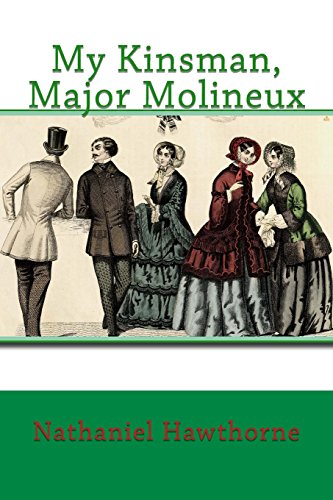Nathaniel Hawthorne, in his story “My Kinsman, Major Molineux,” successfully put forth a moral meaning for the term ‘shrewdness.’ Hawthorne takes the literal meaning – the ability to judge very well and make good decisions- and mixes it so well with his protagonist that we can take out a meaning for our own. Although the story, at first, seems to be about the relationship of kinsmen, the author is of shrewdness through the protagonist by first showing one character of the protagonist: his bold shrewdness and then by showing the changed character of the protagonist: his selfish shrewdness.
As we are introduced to the protagonist Robin, and from his search for the Major we understand that he is the Major’s kinsman. The fact that he is related to a political entity and that he is searching for the Major gives the reader an idea about Robin’s intentions – he is looking for a way to make his fortune. With the sentence; “But the Major will make me welcome to the best of his victuals; so I will even step boldly in, and inquire about my way to his dwelling” (1175), Hawthorne shows us possibly a part of Robins character; Robin is a young youth with a sense of shrewdness, who is looking for an easy way to make his fortune. Furthermore; when Robin enters the tavern and thinks to himself, “The man sees a family likeness! the rogue has guessed that I am related to the Major!” , he is very sure that his resemblance to the Major will assure his fortune. This kind of thinking shows the level of shrewdness Robin has- he has this bold shrewdness that makes us slightly annoyed and even a little judgmental. He is very much confident on the Major and not on himself. His shrewdness has caused him to believe in the power of political entities and wealthier people, rather than believing in his ability to make his fortune.
As the story continues, we are introduced to Robins other characteristics- his naïveté; when the lady with the ‘scarlet petticoat’ says that the Major is inside and he thinks to himself “Now truly I am in luck, and so indeed is my kinsman, the Major, in having so pretty a housekeeper…” (1178), suspicious thinking and temper; when he says “Tell me this instant, whereabouts is the dwelling of my kinsman, Major Molineux?” (1180), his determination to find his kinsman, when he walks all about the town and questions people and finally sits for a long time just because someone told him “watch here an hour, and Major Molineux will pass by” (1180). All these positive qualities make Robin a good character in our mind, but as the story concludes we no longer think that highly of Robin- although what he did is possibly not as bad as what the Major did. We pity the Major and judge Robin because in the end, as the Major is ‘punished’ for his wrongdoings, it is Robin who laughs along with the crowd. This moment of laughing shows to the reader the very change in Robin’s character. He is no longer that young youth with bold shrewdness looking for his fortune by being dependant on another; instead, he is now a selfish man who is punishing his kinsman with the fear of being viewed as the sympathizer of the Major, which would render him vulnerable to the anger of the townspeople. He is laughing, possibly, because he doesn’t want people to think that he is related to the Major, who is not liked very much. His desire for survival gives way to his loyalty and pity for the Major, and also his shrewdness for any finance and assistance the Major would have provided. The ties with the Major are cut off the moment he starts laughing, his character also changes. In our eyes, instead of becoming human, he becomes the villain.
When Robin laughs at the end of the story he has changed in character from a young youth who is looking for a fortune through another, to a young man who has mob friends- as he says so “Thanks to you, and to my other friends…” (1185)- And who is selfish because he keeps his identity secret when the Major is being humiliated. The only thing that hasn’t changed is his acumen, which has altered in the level- he is no longer bold in what he wants, but somewhat confident and even ruthless enough to laugh at his kinsman being humiliated. It is very significant that at the beginning of the story he enters the scene as Major Molineux’s kinsman and exits the story as ‘Robin.’ Shrewdness, as a value, apparently does not connote wisdom, goodness, power, high spiritual values in the story. Instead, it connotes the idea that being shrewd leads a person to be ruthless, selfish, uncaring, and inhuman or other qualities that can be shared with lower animal forms. Robin’s amazement, inability to resolve a situation or prevent a situation and his fear of the townspeople’s wrath do not prevent him from acting selfishly shrewd. Hawthorne provides an obvious clue to make the ambiguity of the term ‘shrewdness’ quite clear. The last sentence of the story reads: “Or if you prefer to remain with us, perhaps, as you are a shrewd youth, you may rise in the world without the help of your kinsman, Major Molineux.” This sentence puts forth, altogether, the central moral message of the story: Shrewdness can be used in a way to make one’s fortune by himself, and not with the help of others. However, the unethical part of this message is the obvious question: How do we use shrewdness without becoming inhuman, like Robin?

